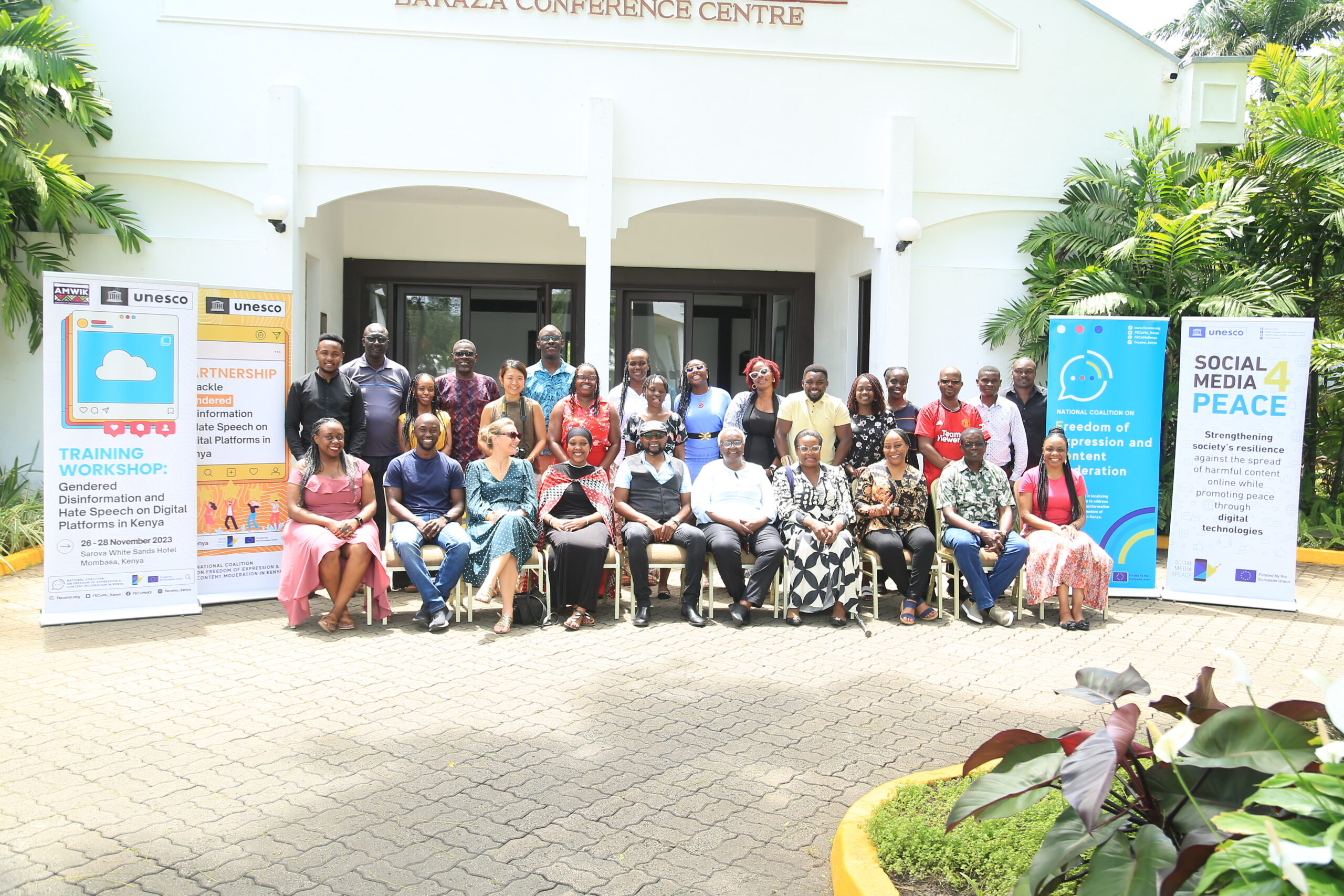
On Wednesday, 29 November 2023, The National Coalition on Freedom of Expression and Content Moderation in Kenya (FECoMo) endorsed a joint resolution for a multisectoral approach and action to address gendered disinformation and hate speech on digital platforms. Recognizing the gaps in existing approaches towards addressing the issue, the Coalition resolved to leverage on its expertise and networks to address this phenomenon, which primarily affects women and girls in Kenya.
The ten-point resolution was the outcome of a three-day workshop facilitated by UNESCO and the Association for Media Women in Kenya (AMWIK) at Sarova Whitesands Hotel, Mombasa, where coalition members had convened a series of expert discussions to conceptualise and formulate innovative strategies for possible solutions to the problem. National regulators, policy makers, media stakeholders, civil society organisations (CSOs), technology, community radio networks, academia, and think tanks were represented at the discussions.

The training was opened by Esther Ingolo, Director of Gender and Disability Mainstreaming in Mombasa County, who stressed the importance of discussion, educational collaboration and the sharing of best practices in countering online gendered disinformation and hate speech.
“Digital platforms often depict women as untrustworthy and undeserving, propagating divisions amongst them. Women in government, politics, human rights advocacy, activism, and public roles are easy targets. This discourages women from pursuing leadership roles or influential positions,” she added, reminding participants that online environments must be safe and empowering spaces for women and girls before SDG 5 can be achieved.
UNESCO Programme Specialist and Global Coordinator for the SM4P project, Adeline Hulin, highlighted UNESCO’s extensive global research on Technology-mediated online Gender-Based Violence (GBV). She introduced UNESCO’s tools and resources that local stakeholders can adapt to the Kenyan context, including the recently published Guidelines for Governance of Digital Platforms. Elaborating on UNESCO’s strategy to strengthen national actors, UNESCO Programme Officer John Okande also pointed to a number of capacity-building initiatives planned for the Coalition.
“We are committed to empowering local stakeholders with tools to combat harmful online content including methods like fact-checking, online monitoring, and fostering peace-building efforts.”
— John Okande, Programme Officer, UNESCO Regional Office for Eastern Africa
Given the multi-faceted nature of gendered disinformation and hate speech on digital platforms, workshop sessions were designed to offer diverse insights from experts operating in different sectors from academia and law to technology and media. Speakers highlighted existing challenges and opportunities specific to their fields in addressing gendered disinformation and hate speech online.
Leo Mutisya, Manager of Research Planning and Strategy at the Media Council of Kenya (MCK) and Lyndcey Oriko from the National Cohesion and Information Commission (NCIC) weighed in on the challenges for regulating digital spaces, which are often characterized by tension between safeguarding freedom of expression and addressing harmful content online.
“While legal frameworks play a key role in shaping the regulatory space, there is also a need to strengthen content monitoring and establish clear channels to report harmful content online.”
— Lyndcey Oriko, National Cohesion and Information Commission (NCIC)
Discussions also highlighted the insufficiency of existing policy and legal mechanisms to safeguard human rights and online safety within digital platforms in Kenya. Kagwiria Mbogori, Lawyer and Women’s Rights Advocate highlighted the importance of aligning interventions in the digital realm with those addressing real-world societal challenges, since online harassment is but a reflection of deep-rooted cultural misogyny and prevalent offline behaviors.
Voices from academia, civic technologies and media also prompted participants to consider innovative approaches to address gendered disinformation and hate speech beyond conventional legal and regulatory perspectives. Other speakers included Professor Levy Obonyo from Daystar University, Daniel Odongo from Ushahidi, and Mark Masai from the Social Newsroom.
The workshop followed a related consultative webinar held on 3rd November, 2023, and is part of a series of interventions to strengthen the Coalition’s capacity to innovate multi-sectoral solutions and provide national leadership on addressing harmful content on digital platforms.
These dialogue spaces brought together thought leaders and experienced practitioners to share cutting-edge insights and facilitate meaningful discussions about the topic. Coalition members reflected that the sharing of diverse perspectives broke down conventional siloes, and allowed them to synthesise their experiences to formulate bolder cross-sectoral strategies during break-out sessions.
At the close of the workshop, Coalition members signed the resolution document as a statement of their commitment to reshape Kenya’s digital landscape and cultivate an environment that champions truth, inclusivity, and respect for all.
Online violence against women and girls, though not a new phenomenon, has escalated rapidly with serious implications for women’s safety and well-being given the growing uptake of social media platforms across the globe. In August 2022, the Countering Disinformation report by the office of the United Nations Secretary-General stressed the need for an urgent response to these growing threats against human rights and fundamental freedoms. It also noted that countering the different manifestations of disinformation requires addressing underlying societal tensions, fostering respect for human rights, online and offline, and supporting a plural civic space and media landscape.
The UNESCO “Social Media 4 Peace” project funded by EU seeks to strengthen the resilience of societies to potentially harmful content spread online, in particular hate speech inciting violence while protecting freedom of expression and enhancing the promotion of peace through digital technologies, notably social media. The project is also being implemented in Bosnia and Herzegovina, Indonesia, and Colombia.
- Read the Resolution Here.
